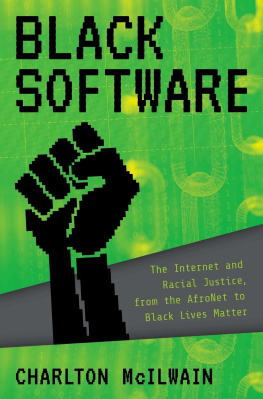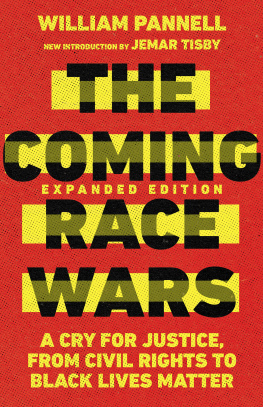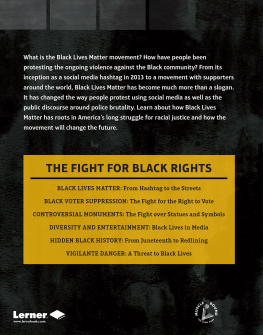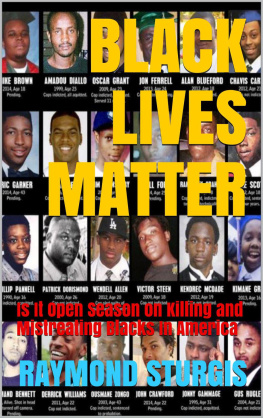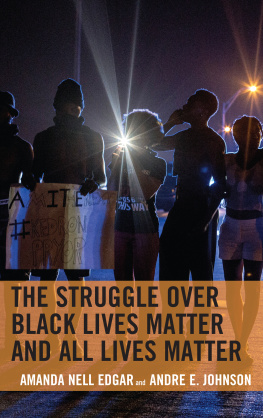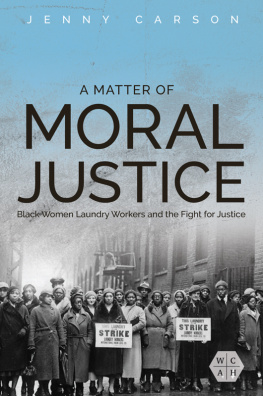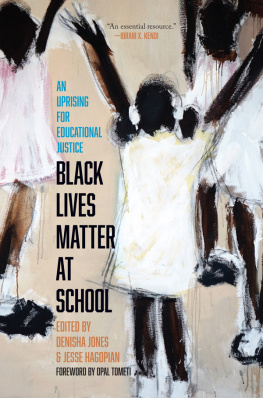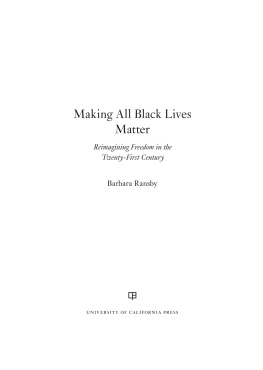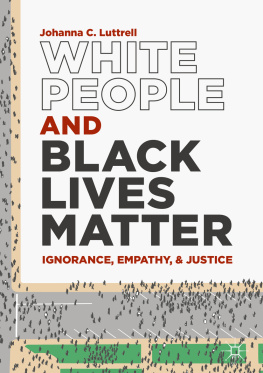Charlton D. McIlwain - Black Software: The Internet & Racial Justice, from the AfroNet to Black Lives Matter
Here you can read online Charlton D. McIlwain - Black Software: The Internet & Racial Justice, from the AfroNet to Black Lives Matter full text of the book (entire story) in english for free. Download pdf and epub, get meaning, cover and reviews about this ebook. year: 2019, publisher: Oxford University Press, genre: Politics. Description of the work, (preface) as well as reviews are available. Best literature library LitArk.com created for fans of good reading and offers a wide selection of genres:
Romance novel
Science fiction
Adventure
Detective
Science
History
Home and family
Prose
Art
Politics
Computer
Non-fiction
Religion
Business
Children
Humor
Choose a favorite category and find really read worthwhile books. Enjoy immersion in the world of imagination, feel the emotions of the characters or learn something new for yourself, make an fascinating discovery.
- Book:Black Software: The Internet & Racial Justice, from the AfroNet to Black Lives Matter
- Author:
- Publisher:Oxford University Press
- Genre:
- Year:2019
- Rating:4 / 5
- Favourites:Add to favourites
- Your mark:
- 80
- 1
- 2
- 3
- 4
- 5
Black Software: The Internet & Racial Justice, from the AfroNet to Black Lives Matter: summary, description and annotation
We offer to read an annotation, description, summary or preface (depends on what the author of the book "Black Software: The Internet & Racial Justice, from the AfroNet to Black Lives Matter" wrote himself). If you haven't found the necessary information about the book — write in the comments, we will try to find it.
Charlton D. McIlwain: author's other books
Who wrote Black Software: The Internet & Racial Justice, from the AfroNet to Black Lives Matter? Find out the surname, the name of the author of the book and a list of all author's works by series.
Black Software: The Internet & Racial Justice, from the AfroNet to Black Lives Matter — read online for free the complete book (whole text) full work
Below is the text of the book, divided by pages. System saving the place of the last page read, allows you to conveniently read the book "Black Software: The Internet & Racial Justice, from the AfroNet to Black Lives Matter" online for free, without having to search again every time where you left off. Put a bookmark, and you can go to the page where you finished reading at any time.
Font size:
Interval:
Bookmark:


Oxford University Press is a department of the University of Oxford. It furthers the Universitys objective of excellence in research, scholarship, and education by publishing worldwide. Oxford is a registered trade mark of Oxford University Press in the UK and certain other countries.
Published in the United States of America by Oxford University Press
198 Madison Avenue, New York, NY 10016, United States of America.
Oxford University Press 2020
All rights reserved. No part of this publication may be reproduced, stored in a retrieval system, or transmitted, in any form or by any means, without the prior permission in writing of Oxford University Press, or as expressly permitted by law, by license, or under terms agreed with the appropriate reproduction rights organization. Inquiries concerning reproduction outside the scope of the above should be sent to the Rights Department, Oxford University Press, at the address above.
You must not circulate this work in any other form and you must impose this same condition on any acquirer.
Library of Congress Cataloging-in-Publication Data
Names: McIlwain, Charlton D., 1971 author. Title: Black software : the Internet and racial justice, from the AfroNet to Black Lives Matter / Charlton McIlwain.
Description: New York, NY : Oxford University Press 2020. | Includes bibliographical references and index. | Summary: Black Software, for the first time, chronicles the long relationship between African Americans, computing technology, and the Internet. Through new archival sources and the voices of many of those who lived and made this history, this book centralizes African Americans role in the Internets creation and evolution, illuminating both the limits and possibilities for using digital technology to push for racial justice in the United States and across the globeProvided by publisher.
Identifiers: LCCN 2019006334 (print) | LCCN 2019980137 (ebook) | ISBN 9780190863845 (hardcover ; alk. paper) | ISBN 9780190863852 (pdf) | ISBN 9780190863869 (epub)
Subjects: LCSH: African AmericansCommunication. | African Americans and mass media. | African AmericansPolitics and government21st century. | InternetPolitical aspectsUnited States. | Social justiceUnited States. | RacismUnited States.
Classification: LCC P94.5.A37 M35 2020 (print) | LCC P94.5.A37 (ebook) | DDC 302.23089/96073dc23
LC record available at https://lccn.loc.gov/2019006334
LC ebook record available at https://lccn.loc.gov/2019980137
135798642
Printed by Sheridan Books, Inc., United States of America
For all the women and men whose contributions to computing and the Internet have scarcely been recognized
For all those who labor in the struggle for racial justice


This book is a collective project, co-produced with many people that I must acknowledge and thank, despite knowing that acknowledgments and thanks are not nearly enough.
My son, Marcus, and my wife, Raechel, graciously lent me so much time that rightfully belonged to them. Marcus was honest enough to tell me that my first draft of the book was boring! And Raechels more sophisticated editorial advice pushed me to write something that was not too sophisticated to be understood by those for whom I wrote this book. I could not have written this book without the love, support, and patience you both showed.
Diana Kamin, Rachel Kuo, and Tristan Beach: I am grateful and indebted to each of you for your interest in and dedication to this project. Your research acumen and your contribution of time ran so far beyond what I paid you for your labor. This book literally would not have been possible without you. Your hard work is etched in every page. Thank you.
I must especially thank the women and men who so generously lent me their time, their words, and their voicesmost personally, a few, posthumously. Kamal Al-Mansour, Lee Bailey, Anita Brown, Derrick Brown, Charlene Caruthers, Allen Frimpong, Malcolm Cassell, Farai Chideya, Barry Cooper, E. David Ellington, Tyronne Foy, Ken Granderson, Dream Hampton, Timothy L. Jenkins, William Murrell, Ken Onwere, and Idette Vaughn, I hope I did your stories justice.
I am also indebted to my colleagues and friends whose conversations, ideas, and writings accompanied me as I wrote the book. To many of my colleagues at the Center for Critical Race and Digital StudiesAndr Brock, Safiya Noble, Sarah Jackson, Lisa Nakamura, Wendy Chun, Paula Chakravartty, Meredith Broussard, Aymar Jean Christian, Meredith Clark, Deen Freelon, Stephanie Dinkins, Margaret Hu, Jenny Korn, Lori Kiddo Lopez, Shaka McGlotten, Kelli Moore, Anika Navaroli, Alondra Nelson, Desmond Patton, Minh-Ha T. Pham, Kiran Samuel, Catherine Knight-Steele, Robin Stevens, Tonia Sutherland, Brendesha Tynes, Farida Vis, Myra Washington, Anne Washington, and Jessica Eaglin.
Thanks to many other colleagues whose conversations and work help to shape my work. These include Andrea Dixon, Robin Coleman, Aswin Punathambekar, Siva Vaidhyanathan, Rayvon Fouch, Pamela Newkirk, Phil Dalton, David Worth, Nick Couldry, Adrienne Russell, Stephanie Richter Schulte, Matt Powers, Rod Benson, Bilge Yesil, Jessie Daniels, Nabil Echchaibi, Mako Hill, Brett Gary, Arun Kundnani, Lynne Clark, David Goldberg, Finn Brunton, Todd Gitlin, Christina Dunbar-Hester, Gina Neff, Lance Bennett, Carmen Gonzalez, Katy Pearce, Phil Howard.
Special thanks to journalist Emily Parker, who worked on key interviews with and conversations about Black Lives Matter organizational leadership.
Special thanks to my 20152016 NYU Humanities Fellows colleagues who provided an engaging audience for the book as it first developed. They include Luke Stark, Narges Bajoghli, Patrick Deer, Valeria G. Castelli, Hiilei Julia Hobart, Sean Larson, Anna McCarthy, Andrew Needham, Sean Nesselrode, Lana Povitz, Myisha Priest, Gwynneth C. Malin, Jane Tylus, and Deborah Willis.
Thanks to Katy Boss, Scott Collard and April Hathcock, at NYU Libraries, who helped in many ways with my research for and production of the book. And to archivists at the Moorland-Spingarn Research Center archives at Howard University who so respectfully assisted my search through what seemed like endless boxes of paper. Thanks to Kreg V. Purcell at the National Criminal Justice Reference Service for help locating crucial historical documents. And thanks to Amy Bradley and Max Campbell at IBM Corporate Archives for assistance with securing permission to use IBM images.
I also want to thank danah boyd, Alice Marwick, and other folks affiliated with the Data & Society Research Institute. Serving as an advisor has given me an opportunity to interact with many scholars whose work helped to invigorate my thinking, and the trajectory of this book.
Thanks to Ken Adams who provided comments on a draft of the manuscript.
Finally, much gratitude goes to my editor at Oxford University Press, Angela Chnapko, and publisher Niko Pfund. They believed in this book when it was just a few pages of ideas and a tiny kernel of the story that became Black Software.
I returned refreshed from my long, Independence Day weekend, determined to start writing this book. That was Tuesday, July 5, 2016. Id cleared a couple of hours in the late afternoon, hoping to produce at least a good page or two. I briefly checked Twitter that morning, on the way to my office. Alton Sterlings name repeated as I scrolled through my feed. In the early morning hours, white police officers in Baton Rouge, Louisiana, had tased, subdued, and then shot Sterling six times at point-blank range. The reports that echoed throughout my curated corner on the social media platform said he was unarmed.
Font size:
Interval:
Bookmark:
Similar books «Black Software: The Internet & Racial Justice, from the AfroNet to Black Lives Matter»
Look at similar books to Black Software: The Internet & Racial Justice, from the AfroNet to Black Lives Matter. We have selected literature similar in name and meaning in the hope of providing readers with more options to find new, interesting, not yet read works.
Discussion, reviews of the book Black Software: The Internet & Racial Justice, from the AfroNet to Black Lives Matter and just readers' own opinions. Leave your comments, write what you think about the work, its meaning or the main characters. Specify what exactly you liked and what you didn't like, and why you think so.

